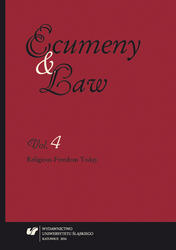An ecumenical-legal reflection that constitutes the pivot of Ecumeny and Law annual’s volume 4 is embedded in the famous adage by St. Augustine: credere non potest homo, nisi volens, which – in a renewed form – became an indispensable part of, among others, Vatican II Dignitatis humanae declaration (1965). The right to religious freedom as such is enrooted in a human person’s dignity in accordance with standards provided by the adequate anthropology – the foregoing thought finds its exemplification in particular articles in the first, theological, part of the present volume. Aside from the historical reference (J. Słomka), the bulk of the texts devoted to the titular religious freedom aims at deciphering the contemporary “signs of the times.” What brings about the universal (ecumenical) framework for the idea in question is Theologia Benedicta. At least two of the conclusions arrived at based on the thought of Pope Ratzinger, deserve our undivided attention: first of all, the biblical-theological concept of freedom differs radically from the Enlightenment-liberal one (the former is distinguished not so much by the freedom of choice, as by the ontic freedom of the being/human); secondly, every instance of considering freedom in abstraction from the religious fundamentals is doomed to ideologically skew it, which is exhibited by, for example, modern and contemporary liberal worldviews slowly morphing into socio-political totalitarian systems (J. Szymik).
The opposite ‟pole” of the volume is represented by an article reflecting on the tragic position of Christians and followers of other religions in the Middle Eastern and northern-African countries, who are suffering under the yoke of aggressive religious fundamentalism. The present situation requires not only immediate political solutions, but also an authentic dialogue between representatives of various Christian Churches and Islam – with an aim of ensuring peace, justice, and religious freedom (A. Halemba). An article opening the legal part of the volume – while perpetuating the standpoint of previously presented theological doctrine – provides scholarly arguments to rebuke the distortion of the sensitive relationship of law with religious freedom; the said distortion is actualized either by blurring the differences between canonical and secular takes on the law-religious freedom relation, or within the area of ius Ecclesiae itself – by, be it consciously or not, trivializing the “systemic” meaning of the law to religious freedom.
The consecutive texts, which are crucial in reflecting on the volume’s eponymous focus, represent elaborations by outstanding experts of confessional law that broadly discuss the origin, development, and contemporary trends in the field of the fundamental right to religious freedom in the legal systems of such countries as: Germany, Austria, Spain, Romania, and the Czech Republic. As usual, the volume includes the reviews of recently published books.
Oś refleksji ekumeniczno-prawnej 4. tomu rocznika „Ecumeny and Law” wyznacza słynne adagium św. Augustyna: credere non potest homo, nisi volens, które w odnowionym kształcie znalazło swe poczesne miejsce m.in. w deklaracji Soboru Watykańskiego II Dignitatis humanae (1965). Prawo do wolności religijnej jest zakorzenione w godności osoby ludzkiej, wedle miary antropologii adekwatnej – do tej myśli nawiązują Autorzy pierwszej, teologicznej części tomu. Obok historycznych odniesień (J. Słomka), gros tekstów poświęconych tytułowej wolności jest zorientowanych ku odczytaniu współczesnych „znaków czasu”. Uniwersalne (ekumeniczne) zręby przedmiotowej idei niesie z sobą Theologia Benedicta. Co najmniej dwa ustalenia poczynione na kanwie myśli papieża Ratzingera zasługują na baczną uwagę: pierwsza, biblijno-teologiczna koncepcja wolności różni się radykalnie od oświeceniowo-liberalnej (wyróżnia tę pierwszą nie tyle etyczna wolność wyboru, ile ontyczna wolności samego bytu/człowieka); po wtóre, każde abstrahowanie w ujmowaniu wolności od fundamentu religijnego nosi znamiona ideologizacji tej ostatniej, czego przykładem są nowożytne i współczesne światopoglądy liberalne, wyradzające się w totalitarne systemy społeczno-polityczne (J. Szymik).
Na przeciwległym „biegunie” sytuuje się refleksja opracowania na temat tragicznej sytuacji chrześcijan oraz wyznawców innych religii w krajach Bliskiego Wschodu i Afryki Północnej, dotkniętych problemem wojującego fundamentalizmu religijnego. Obecna sytuacja wymaga nie tylko pilnych rozwiązań politycznych, lecz także autentycznego dialogu między reprezentantami Kościołów chrześcijańskich i Islamu – w trosce o pokój, sprawiedliwość społeczną i wolność religijną (A. Halemba). Tekst otwierający część prawną tomu – pozostając na gruncie przedstawionych wcześniej założeń teologicznej doktryny – dostarcza naukowych argumentów przeciw zniekształcaniu obrazu newralgicznej relacji: prawo – wolność religijna, czy to przez zacieranie różnic między ujęciami tej relacji w świeckich porządkach prawnych i porządku kanonicznym, czy też w obszarze samego ius Ecclesiae – przez świadome bądź nieświadome bagatelizowanie „systemowego” znaczenia prawa do wolności religijnej.
Kolejne teksty – stanowiące trzon refleksji zakreślonej tytułem wolumenu – to eksperckie opracowania wybitnych znawców prawa wyznaniowego, szeroko omawiające genezę, rozwój i współczesne trendy prawa podstawowego do wolności religijnej w systemach prawnych państw, takich jak Niemcy, Austria, Hiszpania, Rumunia, Republika Czeska. Tradycyjnie, tom wzbogacają recenzje świeżo wydanych interesujących pozycji książkowych.










